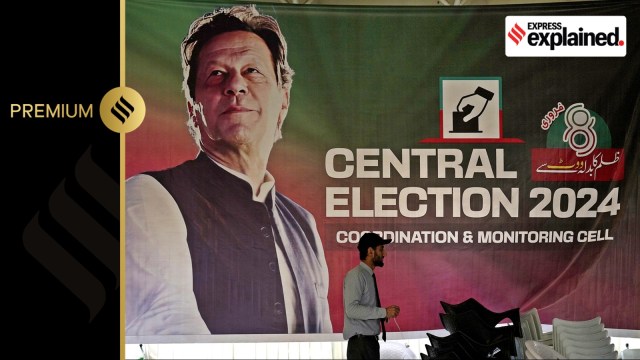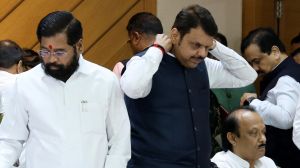Pakistan’s ride-hailing service, Careem, recently posted on X: “Program war gaya?” which literally translates to “program gone bust?” As the country’s election results poured in and independents backed by Imran Khan’s PTI trumped the Army’s preferred Sharif-Bhutto-Zardari combine, this phrase was being used by PTI leaders to refer to how the military’s plans had gone bust.
Soon, Careem clarified it was not making a political point, but was simply advertising a “later booking” option in their cab-hailing service. However, PML(N) workers started the #BoycottCareem campaign on social media, posting bad reviews, and deleting downloaded apps.

The incident is symptomatic of the polarised political environment in Pakistan, which threw up the recent fractured verdict. While the PML(N), led by the Sharifs, the Bhutto-Zardaris’ PPP looks set to come back to power, the message from voters has been loud and clear — possible to muzzle but not to mute.
Unusual, but not unprecedented challenge to Army
The verdict means that the ‘establishment’ — as the Army is frequently referred to in the local media — has been challenged in a manner it is not used to. And that has challenged Pakistan Army Chief Gen Asim Munir’s authority, a development being watched closely inside and outside Pakistan.
Raza Rumi, Editor-at-Large, The Friday Times, and founder of Naya Daur Media, told The Indian Express, “Pakistan’s establishment is known for meddling in politics. However, this time, they too were surprised by the support and sympathy for Imran Khan, as their policies to crush the party have evidently failed. This is a major blow to the narrative spread by the establishment that PTI is an anti-state party. The voters have rejected this and the Army’s standing among the public, especially among the youth, has taken a major hit. Now the institution will have to take measures to restore its image. This is now a huge challenge for Munir.”
The delay in the declaration of results, shutting down of internet and mobile services, and allegations of massive rigging have added to voter outrage. In fact, some are comparing the vocal public discontent to that seen in the aftermath of the 1970 elections, when the people of east Pakistan challenged the writ of the Army.
However, Yaqoob Khan Bangash, Pakistan historian and Dean, Faculty of Humanities and Social Sciences at the Lahore-based Information Technology University of the Punjab, told The Indian Express, “This is not the first election where people have challenged the status quo. We have had several such. First was in 1988 when Benazir Bhutto came to power after over a decade of Zia ul Haq’s rule. In 2018, Nawaz Sharif ran on a clearly anti-establishment line. Furthermore, this election has nothing in common with the 1970 one, which was more about Bengali rights.”
Story continues below this ad
Long feud between Munir, Imran
The current elections have pitted Gen Munir against Imran Khan. And they have a history.
Then Lieutenant-General Syed Asim Munir was appointed the ISI head in October 2018 by then Army chief, General Qamar Javed Bajwa. But eight months later, he was replaced with Lt.Gen. Faiz Hamid on the insistence of then Prime Minister Imran Khan.
Former Indian High Commissioner to Pakistan, Ajay Bisaria, wrote in his book ‘Anger Management, The Troubled Diplomatic Relationship between India and Pakistan’, “The real reason for Munir’s axing would only tumble out into the public domain in 2022. Asim Munir, the revelation went, had dared put the scope on First Lady Bushra Begum and warned PM Imran Khan about corruption in his household.”
Thus began their rivalry, and Gen Munir was possibly the shortest-serving head of the Inter-Service Intelligence (ISI), Pakistan’s infamous spy agency.
Story continues below this ad
Khan himself had been a candidate handpicked by the Pakistan Army and groomed since 2013, before he was famously “selected” the Prime Minister in the 2018 elections. But after he fell out of favour, he continued to challenge the generals.
Last year’s May 9 protests following Khan’s arrest, in which PTI workers and supporters entered military installations, came as a shock to the otherwise untouchable establishment. In fact, there was talk that the military itself was divided, as Khan had been one of their own till recently. Pakistan’s military fired three senior army commanders and disciplined 15 top officers over their conduct during those protests, in what many called the strongest action the military has taken against its own members in decades.
However, the military closed ranks quickly and came down hard on Khan and his party.
Since then, his party leaders and workers have been arrested, harassed and intimidated. So much so that a group of PTI leaders led by Khan’s close aide, Jehangir Tareen, deserted the party and formed a new political outfit, Ishteqam-e-Pakistan Party. This new party had the blessings of the Pakistan Army, and its dismal performance in the recent elections was a further signal from the voters about their preferences.
Story continues below this ad
On Thursday night, a key political leader, Maulana Fazlur Rehman, president of Jamiat Ulema-e-Islam and part of the PMLN-PPP coalition earlier between April 2022 till August 2023, made an explosive revelation in a TV interview: he said it was the Pakistan Army chief Qamar Javed Bajwa and ISI chief Faiz Hameed who asked all political parties to oust Khan’s government through a no-confidence motion in April 2022 — confirming what the conventional wisdom was.
As the Munir vs Khan battle hots up amid the political machinations, the Army chief has much to counter. Raza Rumi said, “The Pakistan Army is a disciplined force and the chief sets the institutional agenda. There is no reason to believe that Asim Munir is less or more powerful than other chiefs. Only Musharraf’s case was possibly different, as he had control over civilian power as well as the West’s formidable support due to the War on Terror. But election 2024 would ultimately result in a recalibration of policy on Imran Khan by Gen Munir and his top commanders.”
What sets PTI apart
With the election mandate “snatched” from them, PTI workers are now challenging some election results, while holding protests against rigging and other malpractices.
Nasim Zehra, Diplomatic and Strategic Affairs Editor at Pakistan’s TV channel, Channel24, and author of bestselling book, “From Kargil to the Coup: Events that Shook Pakistan”, told The Indian Express, “PTI is back on the parliamentary path opting for three tracks — firstly, having won overwhelmingly in KPK, it is set to form government; secondly, at the Centre it will be the main Opposition; and thirdly, it will continue to protest, try to regain its symbol through fresh intra-party elections, and explore coordination with other political parties, targeting the PML(N) & PPP plus the establishment.”
Story continues below this ad
What works for the PTI — and what tripped up the establishment — is that the 2024 elections were held in the age of mobile phones and social media, with an empowered and vocal youth (46% of the electorate), an electorate fed up with the economic mess and 30% inflation, and a high number of women voters (about 47% of the total electorate).
However, what makes the PTI popular also has other consequences.
Bangash said, “The PTI is the first party which relies a lot on social media for its campaigning… its mantra is ‘evil’ vs. ‘good’, which is beyond traditional politics where politicians oppose each other but do not declare elections a ‘good versus evil’ battle. This level of self-righteousness is certainly new in Pakistan. All this then feeds into a very dangerous tendency in the PTI where it is unable to accept the mandate of any other party. This raises serious problems, as without any sense of compromise, the upcoming Parliament will also be hamstrung and little democratic progress will be made.”
Ajay Darshan Behera, Professor at the Academy of International Studies, Jamia Millia Islamia, New Delhi, said, “Imran Khan has called the main established parties as daakus (dacoits), and doesn’t speak the language of reconciliation.”
Story continues below this ad
What the results mean for India, others
If the civilian leadership is shaky and weak, for India, the key question will be who to engage with for any meaningful progress in bilateral ties.
Rumi said, “The incoming civilian government is likely to be an unstable coalition. It is expected that some initiatives will be undertaken to normalise relations with India; but given the political chaos, it is unclear how this would pan out. Especially when the large bloc led by Imran might not be on board with this policy.”
Joshua T White, Professor of the Practice of International Affairs at the Johns Hopkins University’s School of Advanced International Studies, told The Indian Express, “Here in Washington, the most significant concern is that the new coalition government will be fragile, and either unwilling or unable to undertake difficult but necessary reforms related to subsidies, taxation, and long-standing problems in the energy sector. A Pakistan plagued by economic dysfunction is not good for India, the United States, or any other country in the region. It is fair to assume that Pakistan’s military will not permit the elected leaders to exercise much authority when it comes to Pakistan’s relationship with India.”
Jamia Millia Islamia’s Professor Behera said that while the Sharifs are pro-business and would want to open up trade with India to improve their tottering economy, New Delhi may not be bothered, specially as any Prime Minister is likely to have limited power and the shots will be called by Munir. A new government in Delhi in May, with a mandate of five years, will have to take a long and hard look to assess if it should reopen channels of communication with the GHQ in Rawalpindi.
Story continues below this ad
And what is known of Munir’s stand on India? Bisaria’s book narrates an incident when ISI — Munir was DG at that time — tipped off New Delhi about an al-Qaeda plot to carry out an attack in Kashmir in June 2019.
Shortly after PM Modi returned to power for the second consecutive term in May 2019, Bisaria writes, he got a phone call at 2 am with the information. “This was an unusual input that Pakistan seemed to be giving to India. One theory about why the high commission was used as a channel was that the ISI was taking no chances and wanted no repeat of Pulwama; it wanted to make it clear at a political level it was not involved with the revenge attack being planned, but was only giving India a friendly tip-off with a piece of intercepted intelligence,” Bisaria states.
“Another surmise was that General Bajwa, the army chief, through the ISI, was trying to improve the atmospherics in the relationship in the run-up to the Bishkek summit of 14 June, hoping that Pakistan’s sincerity about trying to better relations would register on the Indian side,” he wrote.
White also spoke about how the new government might approach China. “The new government will of course engage with Beijing on a wide range of political, security, and economic topics. But China has been reluctant to write off Pakistan’s debts, and will not provide a silver bullet to the new Pakistani leadership to meaningfully address their structural macroeconomic challenges. Piecing together investments from China and the Gulf States will likely not be sufficient to address Pakistan’s balance sheet, which means that the new government will have no choice but to negotiate with the IMF.”









































